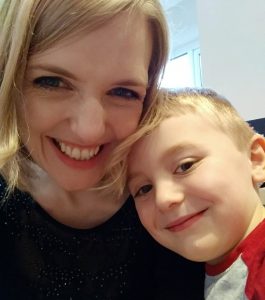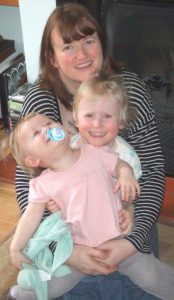Podcast: Play in new window | Download
Keeping in touch with the research whilst on maternity leave can put you in a better position for negotiating project ownership, says Eileen Parkes.

Image credit: Eileen Parkes
Eileen Parkes decided that instead of being a doctor of medicine, she wanted to go into cancer research. So, she started a PhD at Queen’s University Belfast in August 2012. And to everyone’s surprise she turned up to her PhD pregnant!
“I think when I spoke to my supervisor he was a bit taken aback… but he said I was right not to wait.”
It was her first pregnancy and keeping up with the workload proved a challenge, especially as it happened at the same time as a career shift.
“I tried to keep up and do everything as ell as I could. But I guess, you are pregnant, you are tired. You can’t keep on top of things. I was starting a PhD, so I was learning all these new techniques that I had never done before. It was very different to how I worked as a doctor in medicine. So I did find that a bit of a struggle.”
For Eileen one of the bigger struggles was when she came back from maternity leave, and felt slightly removed from others in her lab who didn’t have children.
“I felt they didn’t really understand what was involved… if the creche phoned and I said: I’m midway through this experiment, can you finish it for me? I have to go right now and pick up my child.”
When Eileen started her first postdoc in August 2016, she also turned up pregnant! With both pregnancies, she struggled with ownership of the project.
“And trying to take ownership of the project again I struggled with both times when I’ve come back from maternity leave. Trying to go: Right. I’ve working on this and I’ve built it up and I want to keep working on it. And yet someone else has maybe done some of it when I’ve been off, but I still want to have ownership of it overall…”
But the second time, she made sure to put some rules in place for when she returned.
“I have…tried to put clear “this is my project, this is what I expect to come back to after maternity leave” and kind of discuss with my supervisor better the second time round, how things will work, who will work on it while I’m off and what my role will be when I come back.”
The difficult thing, as Eileen says, is that as a postdoc you never really “own” your work.
“I suppose I am a postdoc as well, you never really have complete ownership of your work. It always belongs to the PI. But what I’ve always done is try to come back with fresh ideas and new ways of moving the projects forward. I’ve tried to stay in touch with the literature and kind of understand where the field is generally.”
Yet despite her contingency plans for returning to work, Eileen’s priority is her children.
“Your priorities should be your child, and no one should feel under pressure to keep on top of the literature and everyone should do what is right for them. For me, it felt right this time that I kept in touch with things. I was excited to see what was happening in the field and to see what shifts there were coming up.”
Don’t forget you can also listen (and subscribe!) to the ScienceMamas podcast on iTunes and on SoundCloud!
